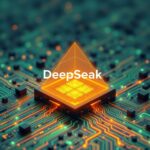Ever felt like the AI race is only for those with pockets deeper than the Mariana Trench? Well, hold on tight, because something’s shifting. A recent article on VentureBeat about DeepSeek really got me thinking about how we approach AI development. They’re not just playing the “bigger is better” game – they’re rewriting the rules.
According to the VentureBeat piece, DeepSeek’s advancements are not just another incremental step; they’ve accelerated the timeline for more efficient AI. This suggests a future where innovation isn’t solely dependent on massive computational resources. And frankly, that’s exciting. It opens the door for more diverse players to contribute and benefit from AI advancements, especially in places like Cameroon, where accessing massive compute power can be a real hurdle.
We’ve all seen the headlines: AI models require training on massive datasets, demanding enormous energy consumption and financial investment. A 2022 study by OpenAI, for example, shows that the compute used in large AI training runs has been doubling every 3.4 months since 2012. This exponential growth isn’t sustainable, especially when considering the environmental impact and the economic barriers it creates.
But what if there’s another way? DeepSeek seems to be proving that clever architecture and efficient algorithms can achieve comparable results with significantly less resources. This approach could democratize AI development, allowing smaller organizations and countries to participate in the innovation process. This aligns with the growing sentiment that AI should be accessible and beneficial to all, not just a select few. As Fei-Fei Li, a leading AI researcher at Stanford, advocates for responsible AI development, this shift towards efficiency is crucial.
Imagine what this means for local businesses and startups in Cameroon. Instead of being priced out of the AI game, they could leverage these advancements to develop solutions tailored to our specific needs and challenges. Think about improved agricultural practices, more efficient healthcare delivery, or personalized education programs, all powered by AI that’s both effective and affordable.
This shift isn’t just about saving money; it’s about fostering innovation and inclusivity. By focusing on efficiency, we can create a more sustainable and equitable AI ecosystem. DeepSeek’s playbook might just be the key to unlocking a future where AI truly benefits everyone.
5 Takeaways from DeepSeek’s Approach:
- Efficiency is the new black: Forget brute force – smart algorithms and architecture are the future.
- Democratization of AI: Smaller players can compete and innovate without needing endless resources.
- Sustainability matters: Reducing compute requirements means a smaller environmental footprint.
- Local solutions: Efficient AI empowers us to develop solutions tailored to our unique challenges.
- Innovation acceleration: Progress doesn’t always require more; sometimes, it requires smarter.
FAQ: Decoding DeepSeek and the Future of AI
1. What’s the big deal about DeepSeek’s approach to AI?
DeepSeek is showing that you don’t always need massive amounts of computing power to build powerful AI models. Their focus on efficiency is shaking up the traditional high-cost, high-compute paradigm.
2. Why is this important for countries like Cameroon?
Access to expensive computing resources can be a significant barrier. DeepSeek’s approach opens the door for us to participate in AI development without breaking the bank.
3. How are they making AI more efficient?
By focusing on innovative algorithms, smarter model architectures, and optimizing training processes.
4. What are some potential benefits of efficient AI in Cameroon?
Think improved agriculture, better healthcare, personalized education, and more efficient resource management – all tailored to our specific needs.
5. Is this shift towards efficiency just about saving money?
No, it’s also about creating a more sustainable and equitable AI ecosystem. It allows for more diverse voices and perspectives to shape the future of AI.
6. What are some other companies doing similar things?
While DeepSeek is gaining attention, many other researchers and organizations are also exploring ways to make AI more efficient and accessible. Look into the work being done on federated learning, edge computing, and model compression techniques.
7. How can I learn more about AI and its potential benefits for my community?
Start by exploring online resources, attending workshops and seminars, and connecting with local tech communities. Look for opportunities to learn about AI applications in sectors relevant to your interests and needs.
8. What are the risks of AI that we should be aware of?
It’s crucial to be aware of potential biases in AI algorithms, the risk of job displacement due to automation, and the ethical considerations surrounding data privacy and security.
9. How can we ensure that AI is used responsibly in our country?
By promoting transparency in AI development, fostering open dialogue about ethical considerations, and developing policies that protect human rights and promote fairness.
10. What’s the future of AI development looking like?
The future is likely to be more focused on efficiency, accessibility, and responsible development. We’ll see more AI solutions tailored to specific needs and contexts, empowering individuals and communities around the world.








